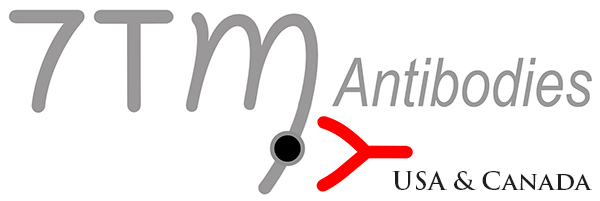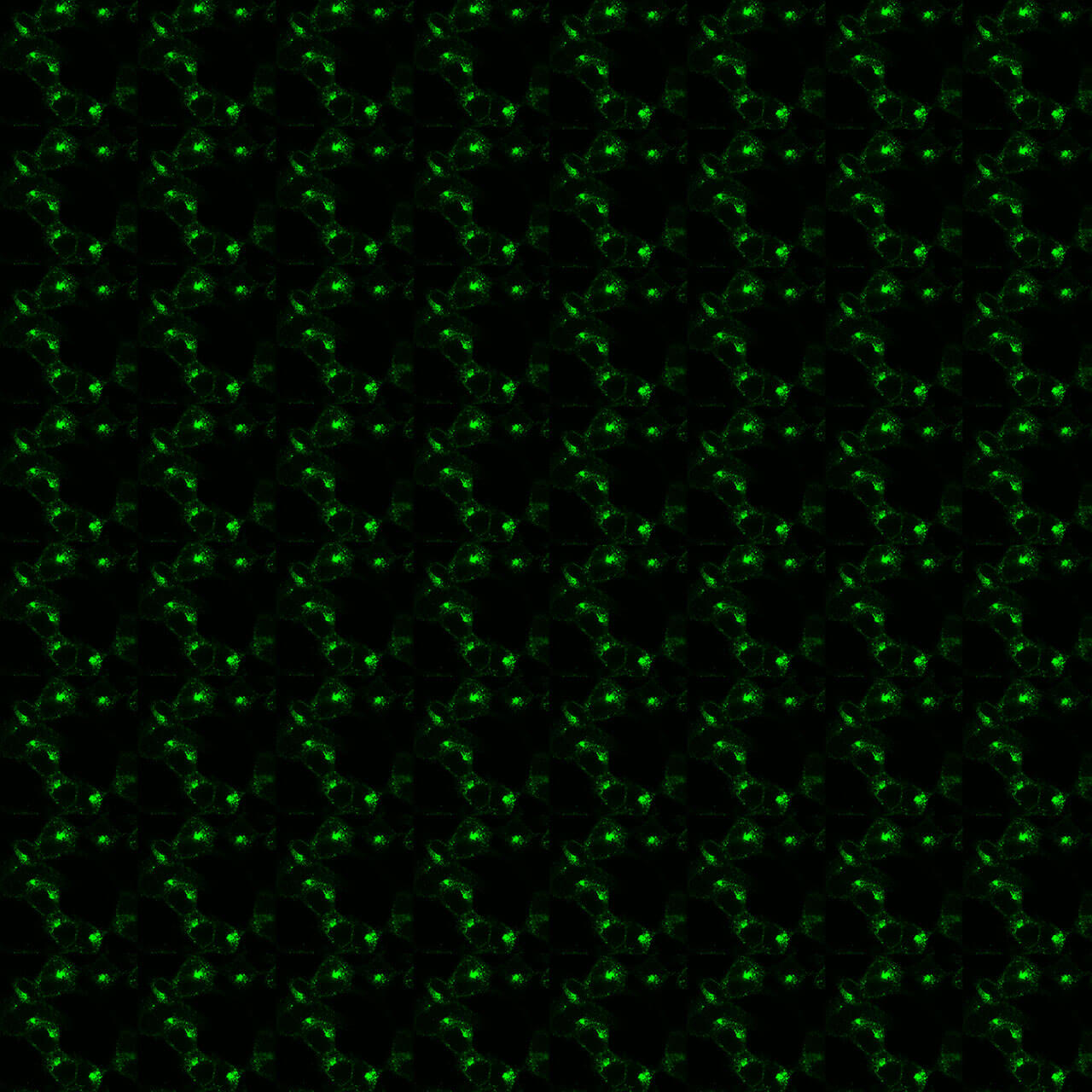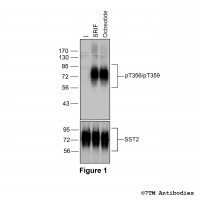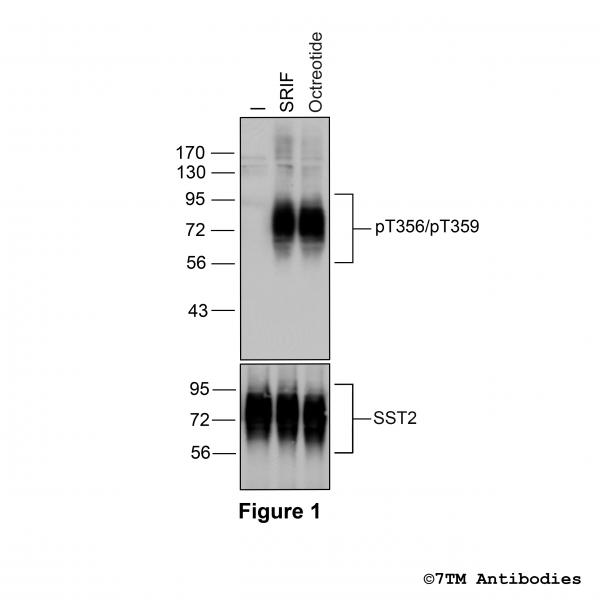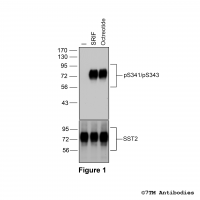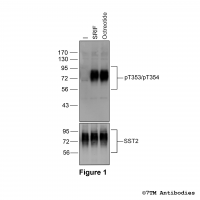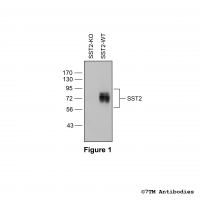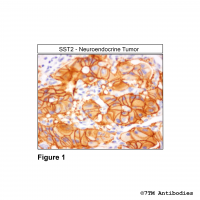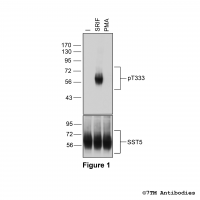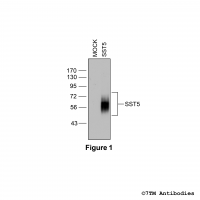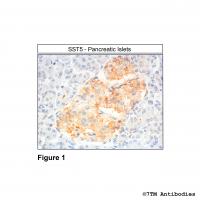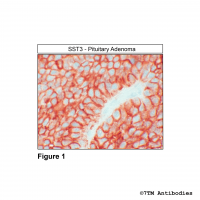Prices plus VAT plus shipping costs
Ready to ship today,
Delivery time appr. 5-8 days
- Order number: 7TM0356C
- Content: 100 µl
- Host: Rabbit
Threonine356/Threonine359 (T356/T359) is a major phosphorylation site of the somatostatin receptor 2 (SST2). The pT356/pT359-SST2 antibody detects phosphorylation in response to high-efficacy agonists such as octreotide and low-efficacy agonists such as pasireotide. T356/T359 phosphorylation is a key regulator of SST2 desensitization, β-arrestin recruitment and internalization. The pT356/pT359-SST2 antibody can detect phosphorylated SST2 in mouse tissues in vivo. The pT356/pT359-SST2 antibody can be used for detection of the subcellular location of phosphorylated SST2 by immunocytochemistry.
| Alternative Names | SST2, SSTR2, Somatostatin Receptor 2 |
| IUPHAR Target ID | 356 |
| UniProt ID | P30874 (human) P30875 (mouse) |
| Western Blot (WB) | 1:1000 |
| Immunocytochemistry (ICC) | 1:200 |
| Species Reactivity | Human, Mouse |
| Host / Isotype | Rabbit / IgG |
| Class | Polyclonal |
| Immunogen | A synthetic phosphopeptide derived from human SST2 around the phosphorylation site of Thr356/Thr359 |
| Form | Liquid |
| Purification | Antigen affinity chromatography |
| Storage buffer | Dulbecco's PBS, pH 7.4, with 150 mM NaCl, 0.02% sodium azide |
| Storage conditions | short-term 4°C, long-term -20°C |
Figure 1. Agonist-induced Threonine356/Threonine359 phosphorylation of the Somatostatin Receptor 2. Upper panel, HEK293 cells stably expressing the Somatostatin Receptor 2 (SST2) were either not exposed or exposed to 1 μM SRIF (somatotropin-release inhibiting factor) or 1 μM of artificial somatostatin receptor agonist Octreotide for 30 minutes. Cells were lysed and immunoblotted with the anti-pT356/pT359-SST2 antibody (7TM0356C) at a dilution of 1:1000. Lower panel, blot was stripped and reprobed with the phosphorylation-independent anti-SST2 antibody (7TM0356N-WB) at a dilution of 1:1000 to confirm equal loading of the gel.
Figure 2. Analysis of dose-dependent Somatostatin Receptor 2 phosphorylation using a panel of phosphosite-specific antibodies. Upper three panels, HEK293 cells stably expressing the Somatostatin Receptor 2 (SST2) were either not exposed or exposed to increasing concentrations of SRIF (somatotropin-release inhibiting factor) ranging from 1 nM to 10 μM for 30 minutes. Cells were lysed and immunoblotted with the anti-pS341/pS343-SST2 antibody (7TM0356A) or anti-pT353/pT354-SST2 antibody (7TM0356B) or anti-pT356/pT359-SST2 antibody (7TM0356C) at a dilution of 1:1000. Lower panel, blot was stripped and reprobed with the phosphorylation-independent anti-SST2 antibody (7TM0356N-WB) at a dilution of 1:1000 to confirm equal loading of the gel.
Figure 3. Immunocytochemical identification of Threonine356/Threonine359 phosphorylation of the Somatostatin Receptor 2. HEK293 cells stably expressing the Somatostatin Receptor 2 (SST2) were either not exposed or exposed to 1 μM SRIF (somatotropin-release inhibiting factor) and immunocytochemically stained with the anti-pT356/pT359-SST2 antibody (7TM0356C) at a dilution of 1:200. Note, Threonine356/Threonine359-phosphorylated SST2 receptors were not detectable in untreated cells (0 min). Threonine356/threonine359-phosphorylated SST2 receptors were seen at the plasma membrane and in perinuclear clusters of vesicles after 30 min.
